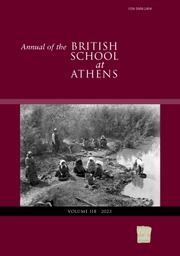Article contents
Excavations in the Neolithic Settlement of Knossos, 1957–60. Part I
Published online by Cambridge University Press: 04 October 2013
Extract
The excavations described here were undertaken for the purpose of obtaining a fuller knowledge of the nature of the Neolithic settlement site which lies below the Minoan palace of Knossos.
The presence of this settlement site was originally recognized by Sir Arthur Evans very soon after he began work at Knossos at the beginning of the century. His numerous soundings established that it was of considerable size, covering the whole of the hill of Kephala below the palace and the surrounding houses (an area of at least 11 acres), and that it must have endured for a long period, since the depth of deposit attained to nearly 10 metres in places. A pottery sequence was worked out by Mackenzie on the basis of the soundings carried out up to 1904, and this was subsequently adopted in essentials by Evans in the final publication. It has subsequently been refined and modified by Dr. A. Furness (Mrs. Ozanne), using Evans's material in the Stratigraphical Museum, in a paper which she published in this journal in 1953.
- Type
- Research Article
- Information
- Copyright
- Copyright © The Council, British School at Athens 1964
References
1 Evans, Arthur, The Palace of Minos at Knossos (PM) i. 34.Google Scholar
2 Mackenzie, D., ‘The Pottery of Knossos’, JHS xxiii (1903) 158–64.Google Scholar
3 Furness, A., ‘The Neolithic Pottery of Knossos’, BSA xlviii (1953) 94–34.Google Scholar
4 Evans, , PM ii. 2–21.Google Scholar
5 The work was supervised during this first season by P. M. Fraser, and the pottery was dealt with by Dr. A. Furness.
6 The following took part in the excavations during these three seasons: as architects, D. Morgan-Jones (1958), P. Pratt and M. Weaver (1959 and 1960); as field assistants, H. Thrane (1958), Mrs. C. Bennett, Countess W. Armfeldt, Miss G. de Bogaarde, B. Kite, M. S. Hacker (1959), Miss J. Close-Brooks, Miss M.-J. Mountain, P. Baird (1960), and P. J. Ucko (1959 and 1960). My wife controlled the sorting of the pottery and the domestic arrangements during all three seasons, as well as helplng on the site. Thanks are due to the Faculty Board of Classics, Cambridge, the Crowther-Beynon Fund of the Department of Archaeology, Cambridge, and the British School at Athens for financial support. The Central Research Fund of the University of London provided grants to cover the cost of my travel to and from Greece for each of the three seasons, and also in 1962 for the study of the excavated material.
7 Kindly identified by Dr. H. Helbaek.
8 Furness, op. cit., n. 3 above.
9 Furness, op. cit., fig. 13 (b), 10.
10 Op. cit., 108.
11 Op. cit. 114, 115.
12 Mosso, A., ‘Ceramica neolitica di Phaestos e vasi dell'epoca Minoica primitiva’, MA xix (1908) 148, 149.Google Scholar He suggests that they might have been used for a game or for divination.
13 Anthropomorphic Figurines of Predynastic Egypt and Neolithic Crete, (with Comparative Material from the Prehistoric Near East and Prehistoric Mainland Greece (Synaxon Limited), forthcoming. The drawings of the figurines reproduced here (figs. 62 – 64) were prepared by Messrs. M. Weaver and P. Pratt under Dr. Ucko's direction for his work. I am indebted to him for permission to use them also in this report.
14 Cann, J. R. and Renfrew, A. C., Proceedings of the Prehistoric Society xxx (1964)Google Scholar, forthcoming.
15 Georgiades, A. N., ‘Recherches sur les obsidiennes de Grèce’, PAA xxxi (1956) 154.Google Scholar
16 Lamb, W., Excavations at Thermi in Lesbos (1936) 181.Google Scholar
17 Blegen, C. W.et al., Troy i (1950) 46, 211Google Scholar; ii (1951) 8, 108, 227; iii (1953) 25.
- 47
- Cited by


